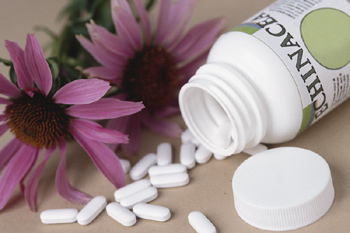Jan 25 2006
Nine of 16 trials found that extracts from the aerial parts of the plant Echinacea purpurea could reduce the symptoms of colds in adults if started early enough. One further trial showed a trend towards this effect. This was the conclusion of an updated systematic Review published in the latest update of The Cochrane Library.

While there are signs of promise, the Authors sound a note of caution. “Our systematic review found some evidence that preparations based on the aerial part of Echinacea purpurea might be effective for the early treatment of colds in adults, but results are not fully consistent,” says lead author Dr Klaus Linde, who works at the Centre for Complementary Medicine Research in Munich, Germany.
Preparations of the plant are widely used in some European countries and in North America for common colds.
The Review Authors found positive effects from alcoholic extracts and pressed juice preparations of the aerial parts of the plants, but they were not able to find benefits from other preparations.
“Consumers and clinicians need to realise that Echinacea products differ greatly in the species of plant utilised, the parts of the plant used, way they have been prepared and in the active agents they contain,” says Linde. “In addition, the overwhelming majority have not been tested in clinical trials,” he adds.
The Review Authors found two further trials that looked at whether the extract could prevent people catching colds. None of these showed any effect. “Other preparations of Echinacea might have preventative effects, but the effect has not been shown in independently replicated, rigorous randomised trials,” says Linde.
This update restricted its focus to preparations that contained extracts from only Echinacea plants, but other preparations exist that contain extracts from additional herbs. Concentrating on just Echinacea extracts reduced the variation in the treatments considered. Even so, Echinacea extracts contain a mixture of different active components, each of which may act on their own, or the effect may only be achieved as they act together. “If this synergistic action does occur, then the exact composition of the extract will greatly affect its performance,” says Linde.